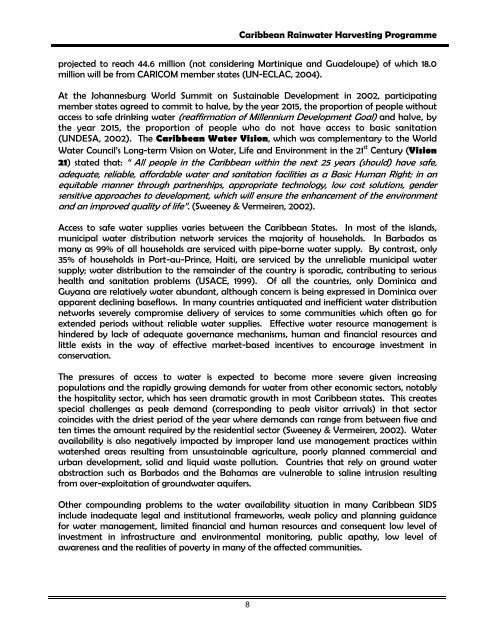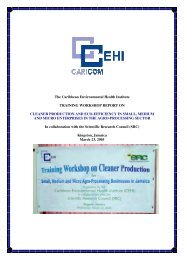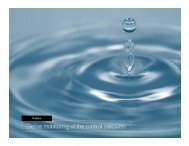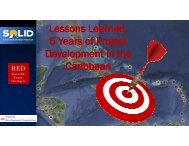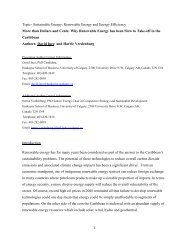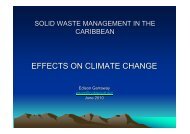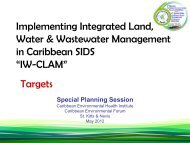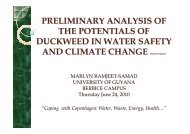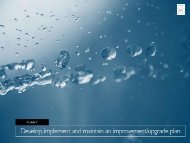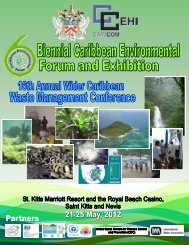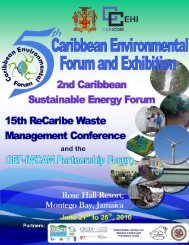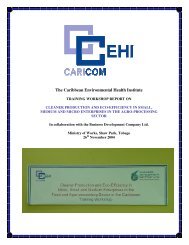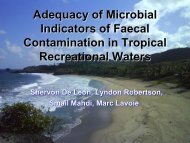A programme for Promoting Rainwater Harvesting in the Caribbean
A programme for Promoting Rainwater Harvesting in the Caribbean
A programme for Promoting Rainwater Harvesting in the Caribbean
You also want an ePaper? Increase the reach of your titles
YUMPU automatically turns print PDFs into web optimized ePapers that Google loves.
<strong>Caribbean</strong> <strong>Ra<strong>in</strong>water</strong> <strong>Harvest<strong>in</strong>g</strong> Programmeprojected to reach 44.6 million (not consider<strong>in</strong>g Mart<strong>in</strong>ique and Guadeloupe) of which 18.0million will be from CARICOM member states (UN-ECLAC, 2004).At <strong>the</strong> Johannesburg World Summit on Susta<strong>in</strong>able Development <strong>in</strong> 2002, participat<strong>in</strong>gmember states agreed to commit to halve, by <strong>the</strong> year 2015, <strong>the</strong> proportion of people withoutaccess to safe dr<strong>in</strong>k<strong>in</strong>g water (reaffirmation of Millennium Development Goal) and halve, by<strong>the</strong> year 2015, <strong>the</strong> proportion of people who do not have access to basic sanitation(UNDESA, 2002). The <strong>Caribbean</strong> Water Vision, which was complementary to <strong>the</strong> WorldWater Council’s Long-term Vision on Water, Life and Environment <strong>in</strong> <strong>the</strong> 21 st Century (Vision21) stated that: “ All people <strong>in</strong> <strong>the</strong> <strong>Caribbean</strong> with<strong>in</strong> <strong>the</strong> next 25 years (should) have safe,adequate, reliable, af<strong>for</strong>dable water and sanitation facilities as a Basic Human Right; <strong>in</strong> anequitable manner through partnerships, appropriate technology, low cost solutions, gendersensitive approaches to development, which will ensure <strong>the</strong> enhancement of <strong>the</strong> environmentand an improved quality of life”. (Sweeney & Vermeiren, 2002).Access to safe water supplies varies between <strong>the</strong> <strong>Caribbean</strong> States. In most of <strong>the</strong> islands,municipal water distribution network services <strong>the</strong> majority of households. In Barbados asmany as 99% of all households are serviced with pipe-borne water supply. By contrast, only35% of households <strong>in</strong> Port-au-Pr<strong>in</strong>ce, Haiti, are serviced by <strong>the</strong> unreliable municipal watersupply; water distribution to <strong>the</strong> rema<strong>in</strong>der of <strong>the</strong> country is sporadic, contribut<strong>in</strong>g to serioushealth and sanitation problems (USACE, 1999). Of all <strong>the</strong> countries, only Dom<strong>in</strong>ica andGuyana are relatively water abundant, although concern is be<strong>in</strong>g expressed <strong>in</strong> Dom<strong>in</strong>ica overapparent decl<strong>in</strong><strong>in</strong>g baseflows. In many countries antiquated and <strong>in</strong>efficient water distributionnetworks severely compromise delivery of services to some communities which often go <strong>for</strong>extended periods without reliable water supplies. Effective water resource management ish<strong>in</strong>dered by lack of adequate governance mechanisms, human and f<strong>in</strong>ancial resources andlittle exists <strong>in</strong> <strong>the</strong> way of effective market-based <strong>in</strong>centives to encourage <strong>in</strong>vestment <strong>in</strong>conservation.The pressures of access to water is expected to become more severe given <strong>in</strong>creas<strong>in</strong>gpopulations and <strong>the</strong> rapidly grow<strong>in</strong>g demands <strong>for</strong> water from o<strong>the</strong>r economic sectors, notably<strong>the</strong> hospitality sector, which has seen dramatic growth <strong>in</strong> most <strong>Caribbean</strong> states. This createsspecial challenges as peak demand (correspond<strong>in</strong>g to peak visitor arrivals) <strong>in</strong> that sectorco<strong>in</strong>cides with <strong>the</strong> driest period of <strong>the</strong> year where demands can range from between five andten times <strong>the</strong> amount required by <strong>the</strong> residential sector (Sweeney & Vermeiren, 2002). Wateravailability is also negatively impacted by improper land use management practices with<strong>in</strong>watershed areas result<strong>in</strong>g from unsusta<strong>in</strong>able agriculture, poorly planned commercial andurban development, solid and liquid waste pollution. Countries that rely on ground waterabstraction such as Barbados and <strong>the</strong> Bahamas are vulnerable to sal<strong>in</strong>e <strong>in</strong>trusion result<strong>in</strong>gfrom over-exploitation of groundwater aquifers.O<strong>the</strong>r compound<strong>in</strong>g problems to <strong>the</strong> water availability situation <strong>in</strong> many <strong>Caribbean</strong> SIDS<strong>in</strong>clude <strong>in</strong>adequate legal and <strong>in</strong>stitutional frameworks, weak policy and plann<strong>in</strong>g guidance<strong>for</strong> water management, limited f<strong>in</strong>ancial and human resources and consequent low level of<strong>in</strong>vestment <strong>in</strong> <strong>in</strong>frastructure and environmental monitor<strong>in</strong>g, public apathy, low level ofawareness and <strong>the</strong> realities of poverty <strong>in</strong> many of <strong>the</strong> affected communities.8


